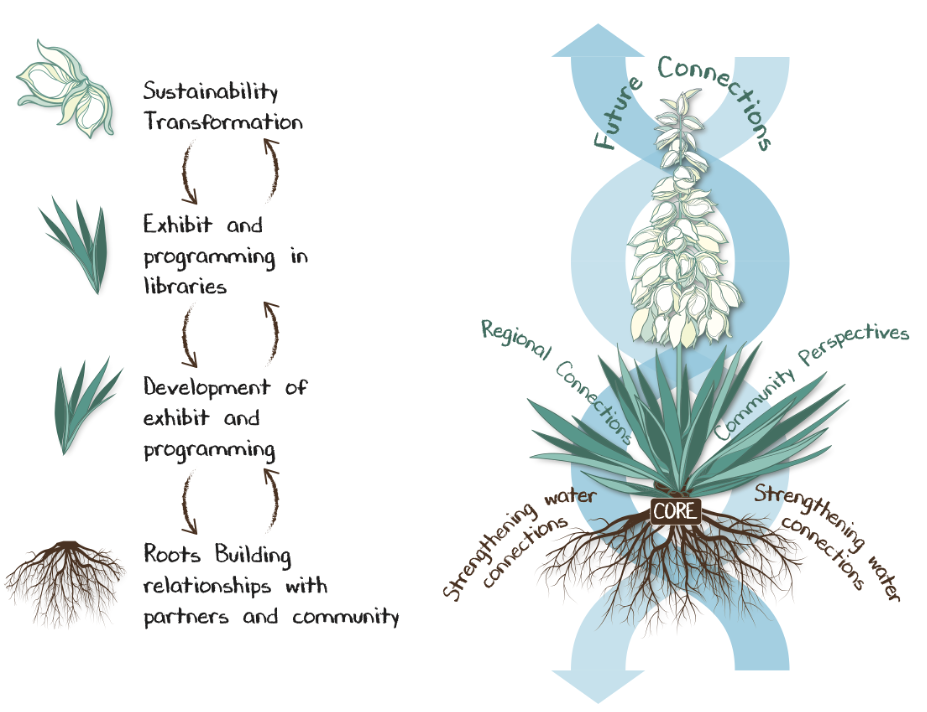We are Patricia Montaño, Katie Boyd, Christine Okochi, Megan Littrell, and Anne Gold from the We are Water project based at CIRES, University of Colorado, Boulder. We used evaluation to put community perspectives at the center of designing informal STEAM educational experiences about water in the Four Corners Region where Colorado, Utah, Arizona and New Mexico meet.
In 2020, listening to communities was a key step in our commitment to a collaborative design process, which we intentionally chose to respect the diversity of voices in the region and to show our commitment to deep partnerships with rural, Latinx, and Indigenous communities. Water issues in the Southwest are complex involving connections to cultures, economics, policy, and science. We wanted to hear from communities directly and have their words steer the direction and content of the exhibit and programs.
Because of the pandemic, we were not able to visit communities in person as planned. We first sent electronic surveys for our needs assessment and over 3 months collected many responses, but we did not successfully reach Indigenous and Latinx communities. We then used a snowball approach, which asks for referrals, to schedule telephone interviews to ask, “What does water mean to you and your community?” Using referrals, we were no longer strangers and we could reach those on the digital divide. We interviewed 12 Indigenous and 8 Latinx community members, and continue to schedule more interviews!
Lesson Learned:
Frequently absent from the conversation about evaluation going virtual during the pandemic is reaching those on the digital divide. If you rely on the internet and use methods that make you a stranger, then you only hear from a few communities. We hope our experience helps you think about inclusion in your evaluation practice.
As part of listening and valuing multiple ways of knowing, we collaborated with our partners Nancy Maryboy and David Begay (Indigenous Education Institute), Shelly Valdez (Native Pathways), and Jill Stein (JKS Consulting) to develop an Indigenous inspired logic model that includes cyclical processes of holistic reflection, evaluation, and adaptation. The yucca plant at the center, found in the Four Corners and valued in Indigenous cultural practices in the region, symbolizes the project’s phases. This blog describes the roots: building relationships, listening to community knowledge and reflecting on how to honor the information shared with us. The model guides our thinking, which we prefer to a traditional logic model.

Hot Tip:
Logic models don’t have one structure. Expand beyond the Western model to include multiple ways of knowing and explore the power of metaphor and symbols.
Rad Resources:
- Read about collaborative design in museums in Nina Simon’s The Participatory Museum.
- Another example of an Indigenous inspired logic model: Cosmic Serpent.
- See how community voices lead to informal STEAM design at We are Water.
We honor and acknowledge that the University of Colorado’s four campuses are on the traditional territories and ancestral homelands of the Cheyenne, Arapaho, Ute, Apache, Comanche, Kiowa, Lakota, Pueblo and Shoshone Nations.
The American Evaluation Association is celebrating Arts, Culture, and Museums (ACM) TIG Week. The contributions all week come from ACM TIG members. Do you have questions, concerns, kudos, or content to extend this aea365 contribution? Please add them in the comments section for this post on the aea365 webpage so that we may enrich our community of practice. Would you like to submit an aea365 Tip? Please send a note of interest to aea365@eval.org. aea365 is sponsored by the American Evaluation Association and provides a Tip-a-Day by and for evaluators.
